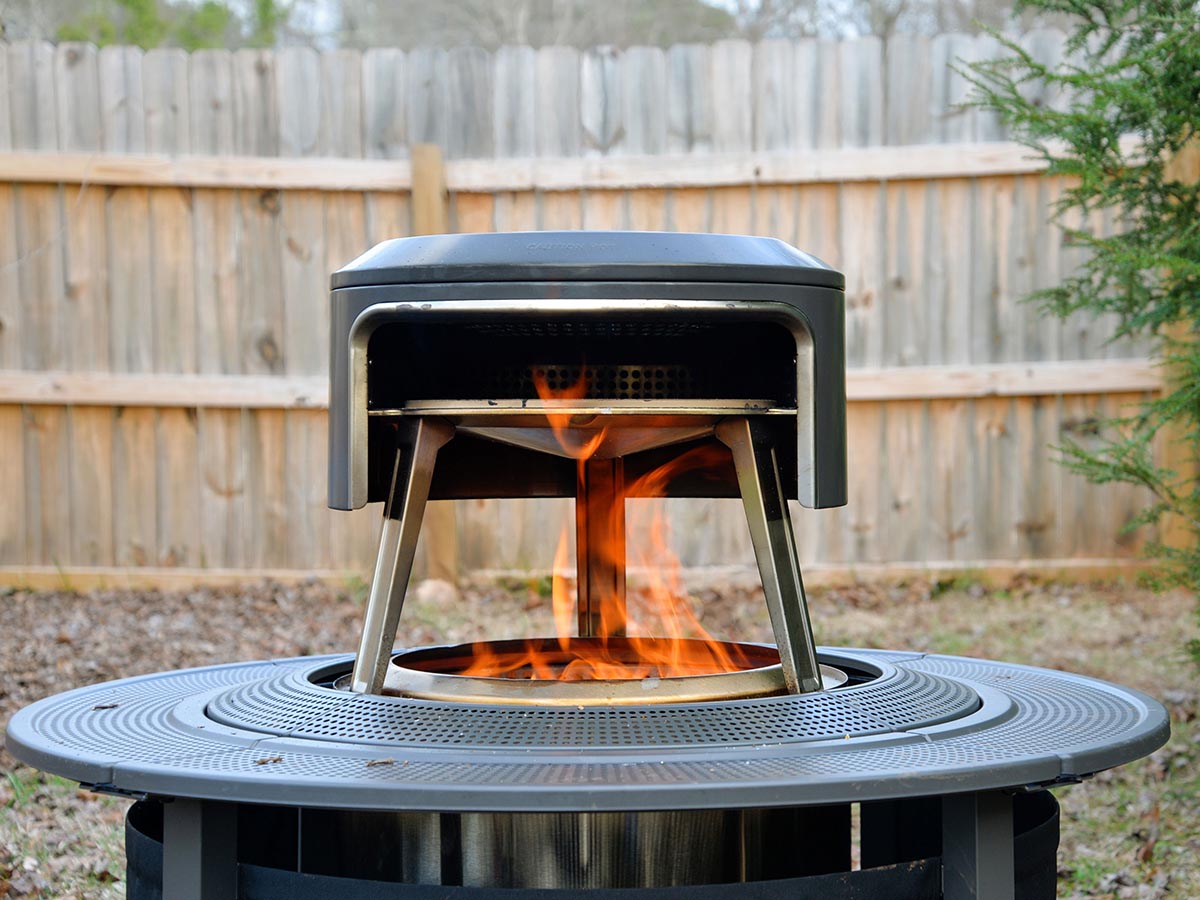

We may earn revenue from the products available on this page and participate in affiliate programs. Learn More ›
For backyard chefs, there is always another gadget to open the culinary horizon and—ideally—improve outdoor cooking. Those who already have a grill and a smoker may be considering an outdoor pizza oven. A pizza oven lets you replicate the professional pizzeria’s perfect crispy crust and toasty toppings at home. The problem is that most backyard pizza ovens are stand-alone units that take up valuable space. Many of us already have fire pits that we don’t use for cooking—yet! So we had to wonder, is it possible to make pizza with a fire pit?
Grapevine, Texas–based Solo Stove has earned a strong reputation and loyal customer base by making some of the best smokeless fire pits around. I’ve tested a few of them for previous reviews, along with fire pit accessories such as the Heat Deflector and Surround. The designs are well thought out, and the quality has been consistently excellent. Most recently I spent 3 afternoons testing the new Solo Stove Pi Fire pizza oven. It currently stands alone as the only fire pit pizza stone accessory on the market. It was easy to set up, fun to use, and after a quick learning curve, my pizzas came out great every time.
Solo Stove Bonfire Pi: At a Glance
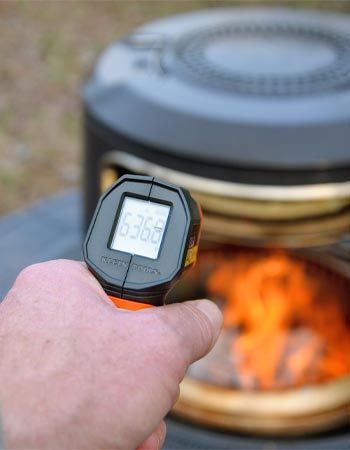
Rating: 9.1/10
PROS
- Engineered to manage heat from the fire pit for balanced top and bottom heat inside the oven
- Durable ceramic-coated stainless steel housing withstands impacts and does not discolor
- Includes a 14-inch pizza stone that heats up to 650 degrees Fahrenheit and produces a crispy crust
- Assembles in about 15 minutes with the included hardware and hex key
- Kit includes insulated gloves and a zipper storage bag with handles for easy transport
CONS
- Kit does not include a pizza peel, the large spatula necessary for launching, turning, and retrieving the pizza
- Kit did not include a laser thermometer, without which it was difficult to know when the oven was ready to cook
Get the Solo Stove Bonfire Pi at:
What is the Solo Stove Pi Fire?
The Solo Stove Pi Fire is a pizza oven accessory for Solo Stove smokeless fire pits. Unlike other pizza ovens, it does not require its own dedicated space in the outdoor kitchen because it stands on the rim of the fire pit, where it reaches the high temperature needed to bake pro-quality wood-fired pizza. The Bonfire Pi that I tested fits both the original Solo Stove Bonfire and the newer Bonfire 2.0. Other sizes are available to fit the Ranger and Yukon models, and in spring 2023, a Canyon (formerly Yukon 30-inch) compatible Pi Fire will be released. Pi Fire pizza ovens ship mostly assembled. The package includes the pizza oven and pizza stone, a zipper-close carry case, and a pair of heat-resistant gloves.
The Bonfire Pi measures 16.9 inches high by 19.3 inches in diameter overall, and it weighs 19.6 pounds. The inner components are constructed of heavy-duty stainless steel, while the exterior housing is made with ceramic-coated stainless steel. The unit stands on three legs, with enough clearance between the fire pit rim and the bottom of the oven chamber to feed the fire.
The cooking chamber, which measures 15 inches in diameter by 2 inches high, is formed by a shallow bowl-shaped steel bottom that deflects heat in all directions, and a hood that retains deflected heat inside the oven chamber. The 14-inch pizza stone sits inside the oven where it reaches up to 650 degrees Fahrenheit or hotter.
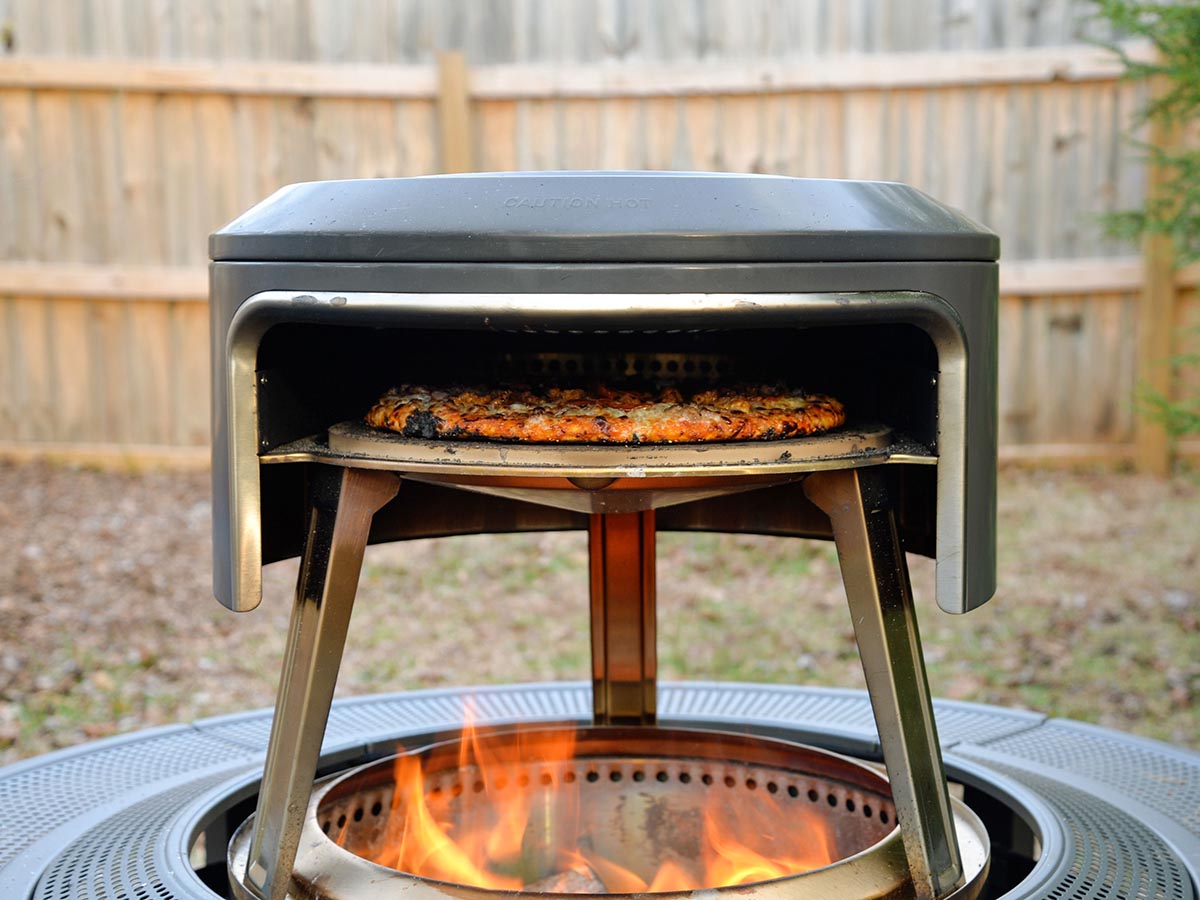
How easy is the Solo Stove Pi Fire to assemble?
The Bonfire Pi arrived well packed and padded, and it was almost completely assembled—I only needed to attach the legs and insert the pizza stone. Six screws later, it was ready to use. If you don’t have tools on hand, don’t worry; it comes with the necessary hex key to tighten the screws.
After assembly, I stood the oven on the rim of my Solo Stove. Two handles on top of the oven, and the included gloves, made it easy to place or remove the oven on an actively burning fire pit.
Is the Solo Stove Pi Fire easy to use?
After I’d attached the legs, which took about 5 minutes, the Pi Fire pizza oven was ready to use. The Solo Stove Pi pizza stone does not need to be seasoned before use, but it does need to be preheated. For best results, the manufacturer recommends allowing the stone to heat up to between 500 and 650 degrees Fahrenheit. This is where I ran into my first challenge, since there is no built-in thermometer. I used my infrared thermometer (Solo Stove also sells one) to read the temperature on the stone, and I was surprised to read a high temperature of 733 degrees Fahrenheit.
After allowing it to cool back down to 650-ish degrees Fahrenheit, I was ready to launch a pizza. This brought my second challenge: The kit did not include a pizza peel, and I didn’t already own one. Since the oven was hot and the pizza was ready to go, I attempted to launch the pizza with a baking sheet. Let’s just say it didn’t go well. So I let the oven cool a bit more and experimented by baking some biscuits and cookies (both on a quarter-sheet pan) while I waited for my newly ordered pizza peel to arrive (Solo Stove sells these, too).
Day 2 went more smoothly. I started a smaller fire, waited until after the temperature peaked and came back down to 650 degrees Fahrenheit (about an hour), and then used the peel to launch my first pizza. I rotated the pizza a quarter turn every 2 minutes, and it came out perfectly in 8 minutes. The open front made it easy to observe the cooking process, and there was enough room on all sides that I could adjust the placement for more or less heat where needed. After the first pizza was done, the stone was still registering 550 degrees Fahrenheit, so I added a log to the fire and launched a second pizza. Following a similar process, the pizza came out really good again, this time with a slightly less brown crust.
The third test day went equally well, including my kids’ contributions of cheater “pizzas” made on store-bought focaccia, tortillas, and naan. For the premade bread, we waited until the temperature was just over 500 degrees Fahrenheit in order to toast the top without burning the crusts. Throughout the testing period, my family and I had a great time experimenting with different ingredients. Once we learned to let the temperature peak and to catch the proper baking temperature on the way back down, using the oven was easy and almost intuitive.
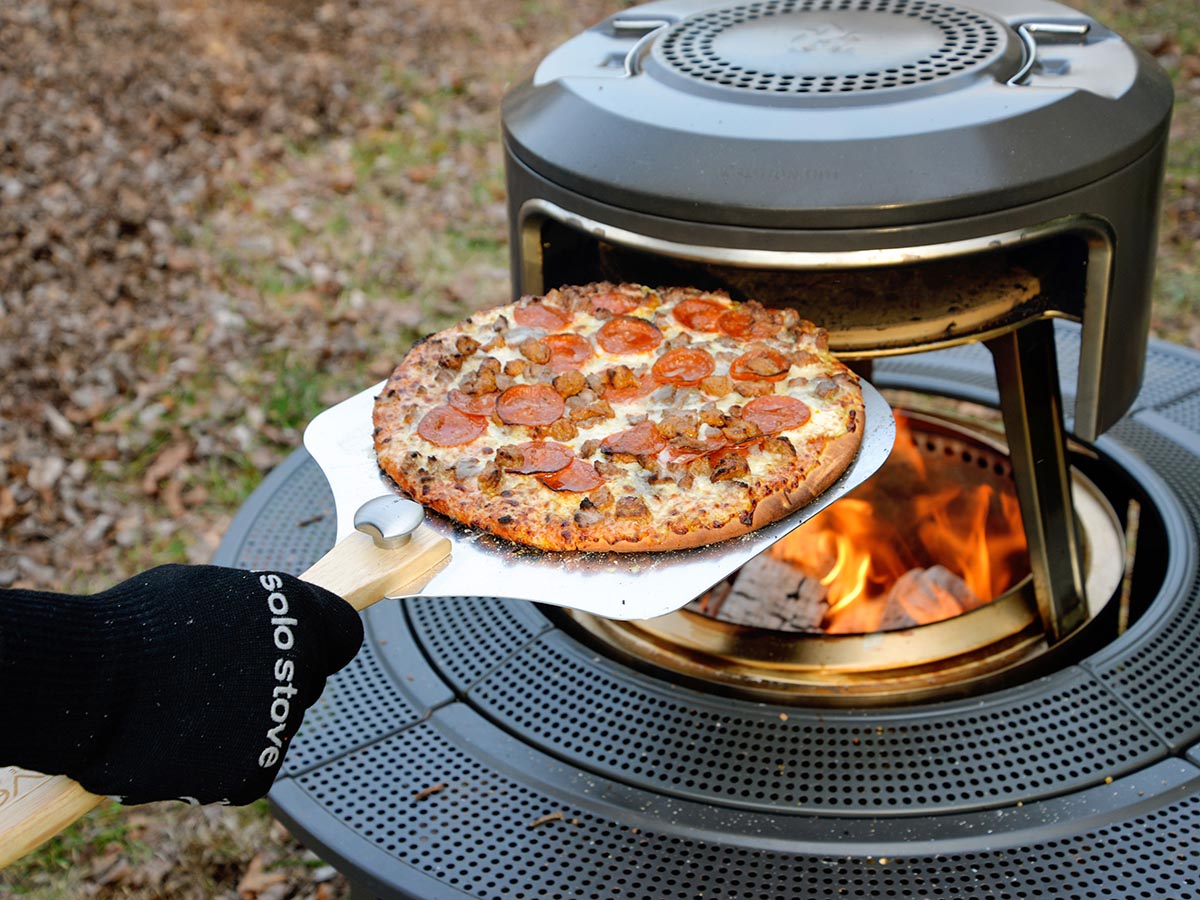
Does the Solo Stove Pi Fire make good pizza?
Once I understood how to manage the fire, my family absolutely loved the pizzas we made in the Solo Stove Bonfire Pi Fire. We usually prefer regular-crust pizza, so that was our go-to choice for testing, but we also made a few thin-crust pizzas just to see how it would go. According to our preferences, regular crust came out best after about 8 minutes in the 550- to 625-degree Fahrenheit range, while the best thin-crust pizzas baked approximately 6 minutes in 600- to 660-degree Fahrenheit temperatures. Crusts were crispy and tops were toasty, just the way we like them.
I’ll also mention that the other things we made turned out really good, too. The oven does have low interior overhead clearance, so baking a regular loaf of bread was not possible, but I would experiment with anything as thick as a baguette at lower temperatures. Our biscuits came out light and fluffy inside, crispy on the bottom and crusty on top. We struggled with cookies because the high sugar content in the dough carbonized quickly in the high heat.
Is the Solo Stove Pi Fire worth the money?
At $259.99, the Solo Stove Pi Fire is something I’d consider to be a premium fire pit accessory. The quality of construction warrants the cost, but the price also compares favorably against other pizza ovens. For instance, when comparing the price of this Solo Stove pizza oven against the price of the Ooni Fyra 12 wood-fired pizza oven, the Pi Fire costs nearly $100 less and boasts superior ceramic-coated stainless steel construction versus the powder-coated carbon steel of the Ooni. Plus, since the Pi Fire is an accessory and not a stand-alone pizza oven, you can get more use from your fire pit.
But is it worth the money if you don’t already have a Solo Stove fire pit? You would need to buy both the fire pit and the pizza oven. The Solo Stove Bonfire 2.0 sells for $259.99, bringing the total cost for both pieces to just over $500. If you don’t plan on ever just sitting around the fire pit, then maybe a stand-alone pizza oven could be a better buy. But for those who are into both fire pit time and homemade wood-fired pizza, then buying both makes sense.
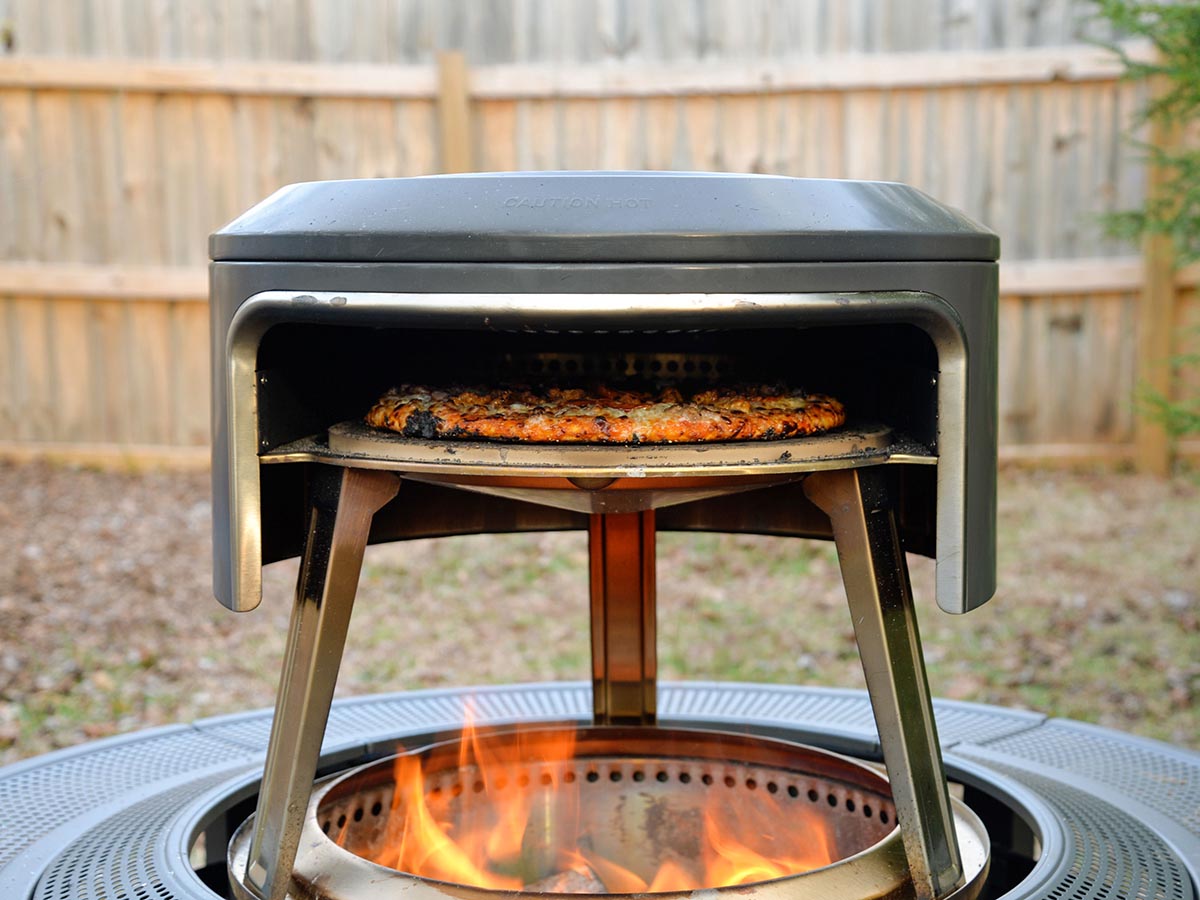
Should you buy a Solo Stove Pi Fire pizza oven?
The Solo Stove Pi Fire enables backyard cooks to make authentically delicious wood-fired pizza—without dedicating permanent deck or patio space to a stand-alone single-purpose cooker. I like that it extends the functionality of the fire pit and that it almost automatically turns fire pit nights into pizza nights, or vice versa. It’s fun and easy to use, makes cooking a more social event, and if you want to extend your epicurean creativity, it cooks more than just pizza.
This accessory is a great buy, or a great gift, for those who already own a Solo Stove or are considering buying one. Anyone who is already in the habit of gathering with friends and family around the fire will appreciate the opportunity to use the pit more frequently or to stack functionality. The carry case makes it easy to protect and stow the oven away when it is not in use, but it allows the oven to be ready to go within minutes after the fire is started. And the pizzas really are good. The portability of the Pi Fire makes it a great choice not only for backyard use, but even for camping and tailgating.
If you purchase this Solo Stove pizza oven, be sure to buy everything you need to get started. I already had a laser thermometer but not a pizza peel, so I wasted a few extra days as I waited for my order to arrive. Solo Stove sells both on its website.
Where to Buy the Solo Stove Pi Fire
Get the Solo Stove Bonfire Pi at:
Meet the Tester
Mark Wolfe is a writer and product tester with an extensive background in the nursery, landscaping, and outdoor-living categories. For more than 20 years he mowed, edged, planted, pruned, cultivated, irrigated, and renovated beautiful landscapes. Now he tests and writes reviews about the latest outdoor power equipment, hand tools, fire pits, and other outdoor-living goods.
